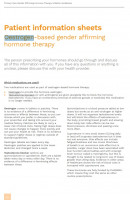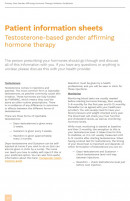Gender affirming hormone therapy
Key points about gender affirming hormone therapy (GAHT)
- GAHT refers to the hormone therapy (oestrogen or testosterone) used by some transgender and non-binary people to help align their body with their gender.
- Not all transgender people use or want to use GAHT.
- GAHT can help improve wellbeing and reduce distress.
- Learn more about gender affirming hormone therapy.

Gender affirming hormone therapy (GAHT) refers to the hormone therapy used by some transgender and non-binary people to help align their body with their gender.
- Hormone therapy (oestrogen or testosterone) can cause changes in the way your body looks and functions that may help to relieve gender incongruence, or help to relieve distress (gender dysphoria) in people who feel like their body doesn't reflect their gender identity.
- Not all trans people experience distress, and not all trans people want GAHT, but for many trans people GAHT is a necessary and important part of healthcare.
- Hormone therapy is only one option in gender affirming healthcare, which refers to medicines and therapies people use to affirm their gender. Other examples include voice therapy, hair removal and surgery.
- Read more about oestrogen based GAHT and testosterone based GAHT.
Note: The word trans is used here as an umbrella term to describe a wide range of genders including non-binary genders. It's used to describe someone whose gender doesn't match what was assigned to them at birth. Read more about gender diversity.
Yes, if you're sexually active and want to avoid pregnancy, you should use contraception if you're using oestrogen based GAHT or testosterone based GAHT. Gender affirming hormone therapy doesn't prevent pregnancy.
If you're using T-GAHT, contraception is especially important. If you become pregnant while taking T-GAHT, this is harmful to the baby. If you wish to become pregnant you should stop testosterone first and discuss this with your healthcare provider.
Some people have problems becoming pregnant after being on T-GAHT. It's not known if this is due to testosterone, or if they would have had fertility problems for another reason. If you need advice on planning a pregnancy, talk to your healthcare provider. T-GAHT doesn't usually affect the quality of your eggs.
No, GAHT is not the same as puberty blockers.
GAHT refers to the hormones (oestrogen or testosterone) that are used by older adolescents or adults to help with development of physical changes which align with the gender you identify with. GAHT has some irreversible effects, meaning they can't be changed.
Puberty blockers (also known as GnRH agonists) are medicines used to pause the changes of puberty. This allows young people time and space to decide what is right for them as they get older. Some young people choose to stop puberty blockers allowing puberty to continue as it would have done. Others who experience persistent gender incongruence may explore whether GAHT is right for them so that they develop bodily changes in line with the gender they identify with.
Transgender New Zealanders(external link) Health New Zealand | Te Whatu Ora
Testosterone-based gender affirming hormone therapy(external link)
Oestrogen-based gender affirming hormone therapy(external link)
References
- Carroll R, Nicholls R, Carroll RW, et al. Primary care gender affirming hormone therapy (GAHT) initiation guidelines(external link) NZ, 2023
- Oliphant J, Veale J, Macdonald J, et al. Guidelines for gender affirming healthcare for gender diverse and transgender children, young people and adults in Aotearoa, New Zealand.(external link) Transgender Health Research Lab, University of Waikato, 2018
Maintenance GAHT prescribing for adult transgender patients(external link) Goodfellow Unit, NZ, 2022
Primary care gender affirming hormone therapy initiation guidelines(external link) Rainbow, University of Otago, NZ, 2023
Qtopia(external link) A national training initiative supporting Aotearoa's primary care workforce to build confidence in how we support our trans and non-binary patients
Webinar: Adult transgender patient care
Rona Carroll and Jennifer Shields cover the latest in healthcare for Aotearoa's trans and non-binary community.
Brochures

Medicines and side effects
Healthify He Puna Waiora, NZ, 2024
Credits: Healthify editorial team. Healthify is brought to you by Health Navigator Charitable Trust.
Reviewed by: Dr Rona Carroll, FRNZCGP, PGDip, Wellington
Last reviewed:
Page last updated:







